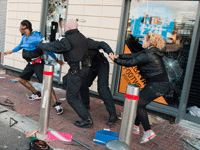
Local authorities attempting to evict social housing tenants involved in the rioting in England will face an uphill battle, according to lawyers.
Councils, including Greenwich and Croydon in London as well as Manchester and Salford, are considering the moves after promising to be tough on convicted rioters and looters.
But social workers have warned that children and families could be forced into unsuitable, unsafe accommodation or left homeless if a relative’s conviction caused their eviction.
“You’re not resolving the problem, you’re just shifting it somewhere else,” said Nushra Mansuri, professional officer for the British Association of Social Workers (BASW). “People and families still need to be housed somewhere and that needs to be recognised.”
Ed Mitchell, a solicitor specialising in social care law, told Community Care that evicting council tenants who have broken the law is far from straightforward. “It is true that a tenant who engaged directly in serious riot-related behaviour in his or her area should be very worried but I doubt whether there will be a wave of evictions,” he said.
Under the Housing Act 1985, it is possible for local authorities to evict tenants who have been convicted of an offence committed within “the locality” of the property. But councils must take the case to court where a judge would decide what areas the definition of “locality” can apply to and whether the council had grounds to evict.
“If nuisance or offending behaviour takes place outside the locality then these grounds are not available to councils,” Mitchell said. This would mean that anyone convicted of rioting some distance from their or their family’s home would be highly unlikely to face eviction.
Otherwise councils would need to prove the conviction had breached terms of the tenancy, which Mitchell said would be difficult.
“It is doubtful that many tenancies would include clauses prohibiting criminal behaviour away from a tenant’s neighbourhood,” he said. “Social landlords are concerned with the well-being of their areas, not with nationwide law enforcement.”
Where a council did have grounds for eviction, the court would take all circumstances into account – such as the seriousness of the offence, a person’s age, whether children would be made homeless, whether the offender is a child of the tenant and the tenant’s parenting history – before deciding whether to allow eviction, Mitchell said.
“Each case will be considered separately so there is certainly no rule that the riot-related conviction of a tenant or a tenant’s child equals eviction,” he added.
An e-petition calling for council tenants to be evicted has already been signed by tens of thousands of people. Claudia Wood, head of the public services and welfare programme at the think-tank Demos, said not everybody had faith in courts to punish appropriately.
“If these perpetrators are given community sentences is that adequate, or do people feel they need further punishment, such as punishing the entire family by taking away their social housing?” she asked.
What do you think?Join the debate on CareSpace
Keep up to date with the latest developments in social care. Sign up to our daily and weekly emails
Blog
Threat to evict rioters from homes is legal flashpoint
Related articles
Rioters destroy Age Concern ambulance
A reflection on England’s riots and their impact on social care


 Bournemouth, Christchurch and Poole
Bournemouth, Christchurch and Poole  Hampshire County Council
Hampshire County Council  Lincolnshire County Council
Lincolnshire County Council  Norfolk County Council
Norfolk County Council  Northamptonshire Children’s Trust
Northamptonshire Children’s Trust  South Gloucestershire Council
South Gloucestershire Council  Wiltshire Council
Wiltshire Council  Wokingham Borough Council
Wokingham Borough Council  Children and young people with SEND are ‘valued and prioritised’ in Wiltshire, find inspectors
Children and young people with SEND are ‘valued and prioritised’ in Wiltshire, find inspectors  How specialist refugee teams benefit young people and social workers
How specialist refugee teams benefit young people and social workers  Podcast: returning to social work after becoming a first-time parent
Podcast: returning to social work after becoming a first-time parent  Podcast: would you work for an inadequate-rated service?
Podcast: would you work for an inadequate-rated service?  Family help: one local authority’s experience of the model
Family help: one local authority’s experience of the model  Workforce Insights – showcasing a selection of the sector’s top recruiters
Workforce Insights – showcasing a selection of the sector’s top recruiters 

 Facebook
Facebook X
X LinkedIn
LinkedIn Instagram
Instagram
Comments are closed.